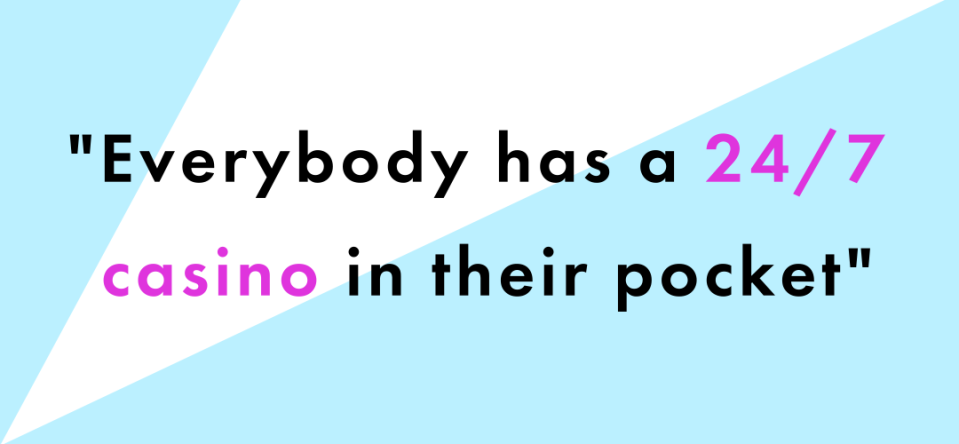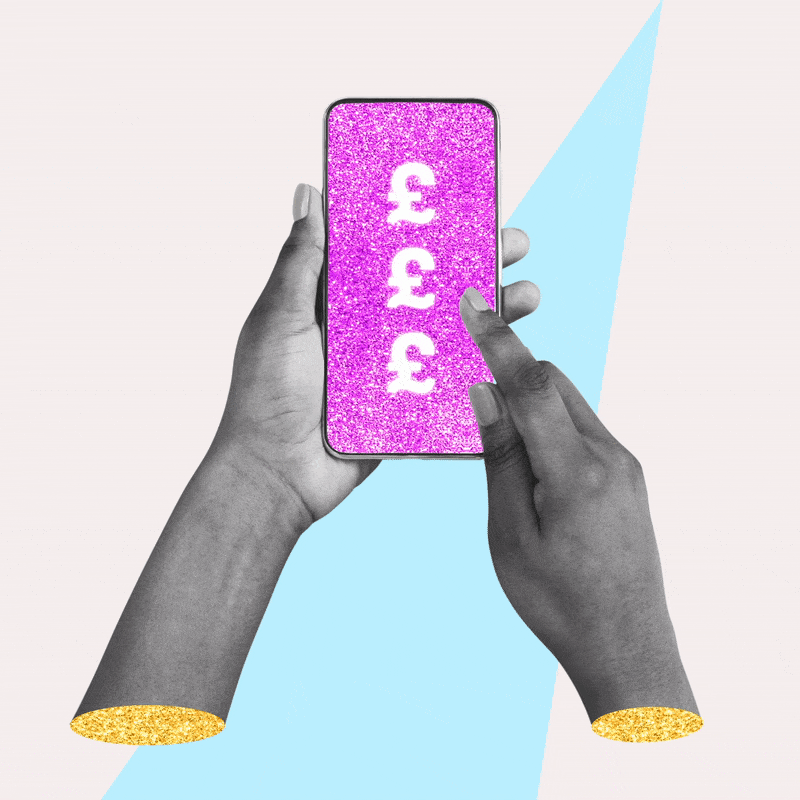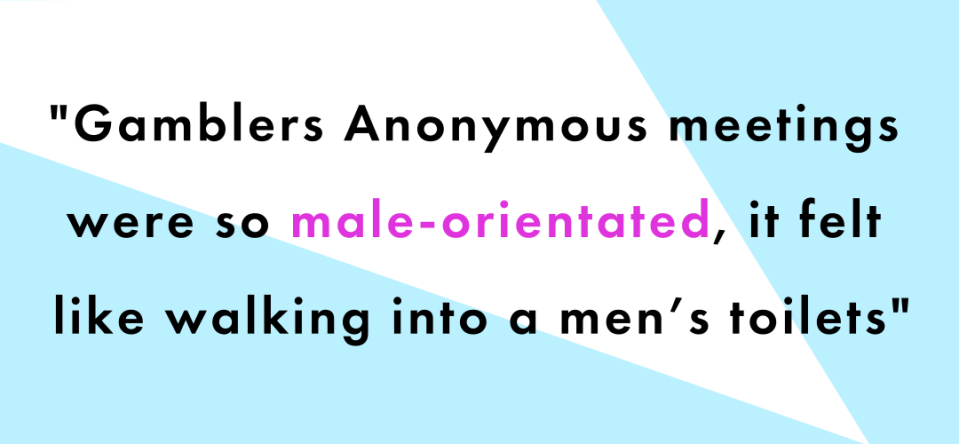"I stole £60,000 to fund my online gambling addiction"

What do you pack when you’re going to prison? Danielle, 24 from Manchester, didn’t know either. After consulting Google, she filled her suitcase with plain t-shirts (you’re not allowed logos), joggers (even though she never wears them) and a sudoku book (to pass the time). When she saw the prison guard take her suitcase away at Liverpool Crown Court, she feared the worst. Her lawyer said a one-to-two-year prison sentence was likely for her crime: stealing more than £60,000 from her employer.
Stealing anything was out of character for Danielle. “I’d give someone their wallet back if I found it on the street,” she says. “For me to have done that… it was shocking even to myself.” But over a period of five years, making a few bets online had turned into an addiction that changed everything.
People associate gambling with betting on football or horses at the bookies — traditionally a male pastime. But the number of female problem gamblers is rising at more than twice the rate of men, according to data from charity GamCare. In recent years, the internet has transformed the gambling landscape and many of the new online games target women. For example, games like ‘Kitty Payout’ and ‘Agent Jane Blonde’ feature cute animals or female characters, and ITV’s Loose Women is sponsored by bingo game Jackpot Joy.
“We've ended up with everybody having a 24/7 casino in their pocket,” says Labour MP Caroyln Harris, chair of the Gambling Related Harm All-Party Parliamentary Group (APPG). After years of pressure to update its gambling regulations for the digital age, the UK government is now undertaking a review of the 2005 Gambling Act.

But like most problem gamblers, Danielle’s struggles started long before she opened a gambling app. She met Abby* during her first year at uni, and while things started off well, around a year into the relationship things became difficult. Danielle began to feel increasingly lonely, which was when she turned to online gambling. “I felt isolated," she says. “I knew that I wanted to leave, but I was worried about what would happen if I did.”
Danielle was working at a local arcade at the time, but didn’t even know how to use the slot machines. She was introduced to a gambling app by a colleague and started playing online scratch cards. Big early wins encouraged the habit (her first bet won £1,000 from a £1 stake), but it wasn’t the gambling itself that kept her coming back, it was the sense of filling a void.
GamCare maintains that gambling can be a fun pastime and Danielle believes that if spending barriers are in place, it could be enjoyed safely. But many games are designed to be addictive, leaving vulnerable people in a position where things can spiral out of control very easily. And when gambling becomes an addiction, the enjoyment often dissipates, the thrill replaced by a compulsion.
“Sometimes when I was supposed to be sleeping, I'd gamble instead,” says Danielle. “It filled-in something that was missing and helped me cope with what had happened throughout the day. It was just something that was always there, that never changed. And at the time, it never hurt me.”

Eventually, she found the courage to leave Abby. Danielle hoped her gambling habit might subside but, feeling lonelier than ever, it began to escalate. The fact that problem gambling has no physical symptoms, unlike alcohol or drug abuse, and that it can happen in private, on our personal devices makes it an easy addiction to hide. After borrowing £12,000 - as much money as she could get from overdrafts and credit cards - Danielle needed a new way to fuel her addiction.
By now, she’d been promoted to the arcade’s venue manager. She took relatively small amounts of money at first, around £100 a time, but it soon crept up to between £1,000 and £3,000 a week.
When Danielle’s employer finally confronted her about the more than £60,000 that had gone missing, she owned up immediately. “It felt like a relief,” she says. “Even the police didn't understand why I was being so honest, but I'd been wanting to tell everyone this for so long.”
An even bigger relief came a year later. On account of her good character, Danielle - along with her carefully-packed suitcase - was told she'd been given a suspended sentence and wouldn't have to go to prison after all. “The judge told me I could leave, and I said, 'Can I actually go?' I didn’t know what to do,” she says. Instead of a jail term, Danielle has to complete 25 rehabilitation activity days and 175 hours of community service.
Now, she is interviewing for jobs and has signed up for a course of cognitive behavioural therapy. She hopes the CBT will help her deal with difficult experiences from her past — her father left when she was very young and she lost two grandparents within a few weeks of each other. “I’ve been suffering from anxiety and depression,” Danielle says. “But that was there before the gambling started. If I’d have dealt with what happened to me in life, it might not have been so easy to slip into the addiction.”

She also wishes that more women spoke up about problem gambling. “When I first started dealing with the addiction, I felt like there wasn't any female-orientated help. Gamblers Anonymous (GA) meetings were all male-orientated,” says Danielle.
The perception of gambling as a man’s problem leads to fewer women seeking support, a 2020 report by GamCare’s Women’s Programme found. Shame and stigma are also more likely to prevent women from finding help. 39% of female gamblers said feeling embarrassed or not wanting people to find out about their gambling was a key barrier to accessing support, compared to 22% of male gamblers, according to a 2020 study by charity GambleAware.
Currently, the only two residential care centres for problem gamblers in the UK are for men. Kerri Nicolls, outreach worker at the Gordon Moody Association - the charity that runs the centres - is a recovering problem gambler herself, and is working to introduce more female-focused support. “It felt like walking into a men’s toilets,” she says, recalling her first GA meeting.
Kerri's organisation is designing a women’s residential programme due to launch later this year. “[Female-orientated support] is going in the right direction, but it's still catching up,” she says. For example, when lockdown made online gambling users more vulnerable last year, Kerri started a women-only Zoom group.

“A lot of women use gambling to self medicate and they may be victims of trauma,” says the Gabling Related Harm APPG’s Carloyn. “I want to see women advising projects as to how they can best provide for women in recovery.”
The MP adds that currently, there is no independent money funding the issue of problem gambling. GamCare, the Gordon Moody Association and GambleAware are all largely funded by the gambling industry itself. “We need to have a mandatory levy for gambling companies and a completely independent body allocating the funds,” says Carolyn. “Then we can start looking at channelling money specifically into projects for women.”
Danielle’s experiences have inspired her to become a counsellor herself one day. “Words can’t describe how sorry I am for what I did,” she says. “It was a terrible breach of trust. But I can’t turn back time, which is why I’m telling my story, as I hope it might help more women open up about these issues and not end up in the situation I did.”
*Name has been changed
What to do if you think you’ve got a problem with gambling
Talk to someone
“Speaking about a gambling problem is a key step,” says Kerri. “If you feel that you can't speak to a family member or friend, reach out to one of the services for some professional support.” She suggests speaking to your GP or one of the gambling centres like the Gordon Moody Association, GamCare or GA.
Self-exclude from gambling sites
Self-exclusion is when you ask a gambling company to stop you from gambling with them. GAMSTOP is a free service that lets you exclude yourself from all gambling sites licensed in Great Britain. You can also download Gamban, a free gambling website and app blocker.
Reorganise your money
“You need to limit your access to money, such as by giving a family member the responsibility of managing your finances, which is what I did,” says the Gordon Moody Association’s Kerri. Alternatively, she suggests getting a bank account with Monzo, a mobile bank that has built in support for problem gamblers.
Make a debt repayment plan
“Financial issues tend to be one of the big problems caused by problem gambling,” says Kerri. “Get in contact with StepChange Debt Charity. They can talk to you about different options for managing any debt.”
Find treatment
Centres like the Gordon Moody Association, GamCare or GA can help direct you towards a variety of treatments, from gambling therapy to online chat. If you are also suffering from mental health problems or recovering from a trauma, consider speaking to your GP about doing a course of therapy through the NHS.
Stop gambling for good
“There are plenty of people that can gamble without it doing them any harm,” says Kerri. “But from my experience, if you've had a gambling problem, you won’t be able to go back to it in a controlled manner. When people feel better and start to gamble again they just spiral back into the habit.”
The latest issue of Cosmopolitan UK is out now and you can SUBSCRIBE HERE.
Like this article? Sign up to our newsletter to get more articles like this delivered straight to your inbox.
You Might Also Like

